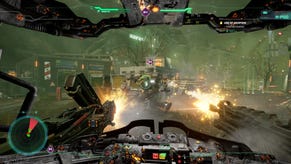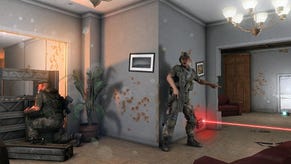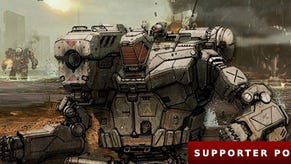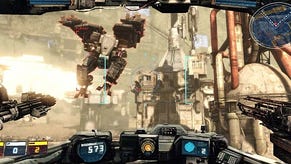Interview: Hawken Publisher CEO On Mechs, F2P, VR
Mechworrier
We sent Brendan to the Hawken press event in London, and there he caught up with Mark Long, boss at Meteor, the company responsible for publishing the F2P mech combat game. From there it was a journey into alternative business models, transmedia experiments, live-action mech-movies, rivalry between mech games, and the appeal of adult diapers.
RPS: You’re the publisher for Hawken, rather than part of the development team. It feels quite unusual to me for there to be a mid-sized publisher and a mid-sized independent studio working together. How did that come about?
Mark Long: It probably represents the current business that we’re in. I was like everybody else when I saw Hawken on YouTube. It really captured my imagination, I was fascinated by it. And I got in touch with Khang Le and offered to help any way I’d be able to. At the same time a good friend of mine Mitch Lasky, who financed Riot, contacted me with a mutual interest in Hawken at the same time. We convinced Khang and Adhesive to not publish Hawken as an XBLA game but to find a bigger audience by going free-to-play on PC. So we want – and Adhesive wants – to maintain its independence and creative control. They stay down in Pasadena and we created the publishing arm up in Seattle.
RPS: You convinced them to go free-to-play and from what I’ve read you’re a big proponent of free-to-play. From your experience of looking at Hawken, how does it circumvent the usual pitfalls of free-to-play? People complaining about it being pay-to-win and so on. How does the game itself get around that?
ML: You know, you have a schism in this business model right now. Free-to-play is primarily on mobile and social titles and I would argue that they’re using worse practices. I mean, Zynga is burning customers, creating compulsion loops, not really games. Creating frustration that you can buy your way out of. Then mobile games, they know players churn out super fast, so they’re just trying to get money out of their pocket immediately. They give you a really limited experience but then the opportunity to pay to win. But it doesn’t follow that that’s the way free-to-play has to be. In fact, if you’re really into the game... like, what’s your favourite game right now?

RPS: Right now? I’m playing through Dark Souls at the minute. That’d be my favourite game right now. But I don’t know how you’d do free-to-play on that. [Frankly, I can’t think of anything more horrifying. But I want to hear Mr Long out.]
ML: Well, imagine Dark Souls went [more] multiplayer and some other things and you’re really into Dark Souls. By giving you the opportunity to customise the game your own way, like you could run your own servers, your own clans, only your friends could play there, you could modify the appearance of the game to reflect your interests. Rank, affiliation. Then that’s why you would spend money, right, if it was [otherwise] free. That’s what we’re doing. It’s mostly about customisation of your mech and the ability to change them in ways that suit you. Not ‘I have to buy this mech in order to have any fun’.
RPS: Do you think that free-to-play is going to replace the standard business model then? When I say ‘standard business model’ I mean the pattern of investment, development, release, cashing in, and then moving on to the next thing.
ML: Yeah, what we call the advance against royalty model. Absolutely, it’s going to change it. It will change things on retail side as well.
RPS: Do you think it’s going to replace it though?
ML: I don’t think it’ll entirely replace it. We don’t have a huge influence on that. But I like to say you can’t compete with free, really. If you have a free version of a great first-person military shooter that is the equivalent to Call of Duty and then you’ve got a $60 choice for Call of Duty, then that’s a tough space to compete in. But I don’t think it’s going to happen overnight. We’ll see console publishers being successful into the next cycle, there are all sorts of reasons I’d just want to pay up front and have a ‘known’ experience. On the other hand, I’m ready to experiment on my PC and have influence over the design. Because that’s really what free-to-play is – it’s gaming as a service. It’s not a product. You’re engaging more fundamentally with your audience than you’d normally do. And a thing that often is not talked about is that free-to-play also means connected completely with analytics and telemetry embedded in. So it’s not just about what the player bought, it’s about kill/death ratio, what points in the map are everybody dying in. So the developer can study all that without the player even voicing an interest in those changes. We can see it and we can change the experience for the player.

RPS: It’s sort of development by overwhelming data, rather than by people giving you straight feedback, saying ‘I like this, I don’t like this.’
ML: Yeah, which if you think about it is really smart compared to the way we have been making games, which is: I come up with an idea in secret and convince a publisher to give us money. Two years later, it comes out and I discover that I was completely wrong. But I had a massive ego that convinced everybody that I knew what I was talking about and then the game hits the shelves and is gone in two weeks and completely forgotten about. This is kind of the opportunity to release a title with what we sometimes call a ‘minimal viable feature set’ and then allow the player to decide what direction the design should go from there.
RPS: It does have a few pitfalls though, this business model. For example, Planetside 2 is having some teething issues with its servers. It’s possible you can be a victim of your own success. The amount of players can overwhelm you.
ML: Right, like Riot and League of Legends, like Diablo...
RPS: Exactly, so are you afraid the same thing might happen? Have you made any preparations to avoid something like that?
ML: Our approach is completely different. I’m not saying we aren’t going to have trouble at the beginning but we have designed to scale infinitely and dynamically, on demand. So, when more players enter the game we spin up more servers. When more players leave the game we spin down servers. So you get a kind of Goldilocks matchmaking, where there’s just enough players in the servers with good ping that I can join a game at any time.
RPS: So when you say ‘scale infinitely’ you’re talking about cloud computing. How exactly does that work? What do you mean? My tech knowledge isn’t very good.
ML: No, it’s okay. Well, in what we call the dev-ops world what we would do is say, ‘okay, let’s take our server and to be efficient we’ll put as many players on it as we can.’ And a server is a single PC in a rack somewhere, right? And it’s important where that rack is because it gives you good ping. All of us are talking through that server to each other, right. That means every time you want to open a new territory you’ve got to lease a data centre that’s central – blah blah blah. Well, Amazon, several years ago decided that like Google they were really in the computing business. They were using compute power for sales and then to distribute books but they realised that they could then convert that computing power to do almost anything. So they kind of virtualised the servers, so there’s a layer that says ‘this processor on a single PC can be Linux and the one next to it can be Windows’ and then this can run a spreadsheet and then that can run Hawken, believe it or not. So you have massive efficiencies but most importantly you can start a server when you need it. As opposed to saying ‘Well, I’m going to lease things for the month of November and I hope that we’ve guessed right for launch.’ Because if we don’t then we have to physically go down there and get more machines and negotiate a contract. So, hopefully we’re going to see a less painful launch than people doing those things.

RPS: Another pitfall might be more specific to the user. A person might see Hawken and say, ‘Okay, free, brilliant. But this is never going to run on my PC because, well, look at it.’ I guess that’s half their problem but lots of F2P developers would go for an audience with lower specs machines so as to get as many people as possible. But with Hawken you’ve gone for mid to high-end specs. I guess I want to know why you’re so confident there’ll be a good uptake of players.
ML: Well, one of my greatest surprises when I went down to Adhesive – because I really know my way around the Unreal engine – was opening up the level editor and seeing that these guys had pulled out every trick we knew as console developers to get the game to run on low-end machine. Which makes sense because they all came from project offset where they had written their own game engine, right? So [a PC with] Hawken’s min spec would play 70% of the games on Steam right now. So it’s actually not a high-end spec, it’s actually mid to low-end. Hawken doesn’t have normal maps – a lot of people don’t realise that – but then there’s all kinds of things we’re not doing and yet the game looks amazing. So it’s not really about the technical details, instead it’s about Khang Le and Adhesive’s vision for that world that’s so unique. But it’s almost fractal in nature with Hawken. You stand back and look at it and there’s this kind of noisy environmental structure but somehow it works and it never breaks down. The smaller parts look like the bigger parts.
RPS: You’ve teamed up with Oculus Rift, the VR headset folks, to make their gear work with Hawken. How does that change the way the game is played? Does it?
ML: One really beautiful accidents about Hawken is that when you watch a movie n 3D, you’re trying to convince your eye that a flat surface in the theatre that’s ten feet away is actually infinity or even two feet away. And even though you’re looking at a 2D surface your eyes are doing what’s called accommodation. They turn inward and outward to focus. And if you wear a HMD [head mounted display] with a corridor shooter everything is like one metre away from you. So really you’re cranking your eyes inward, it can make you sick, it can give you a headache. But the Hawken world is all about ten metres to a thousand metres away, so it’s all focused in the middle. So it’s a perfect fit. It’s just a cool world, I want to be in that world. Well, that’s what you do when you put on the HMD.
RPS: I’ve read you were once involved in researching VR back in the day [Long once worked for the research body SRI International]. Would you like to see this as the coming of age of VR?
ML: I would love that. When I first got into gaming that was our goal, to make virtual reality games. This was like 1994, 1995. That was a very exciting idea. There was a HMD coming out for Sega Genesis, there was an Atari Jaguar one, there were three or four for the PC. They all came out and they were complete failures! They were horrible experiences. They were laggy, they made people nauseous, they were heavy, they were painful to wear. But most importantly the state-of-the-art LCDs in them – which were 240 by 480 – they were basically taking camera viewfinders and putting them right in front of your eyes. So it was a completely disappointing experience. But now we’ve kind of come full circle. Oculus Rift is the optimal industrial design. It’s like ski goggles. It’s comfortable, lightweight. And they’re taking advantage of the high-resolution poly-silicon displays that we’ve developed for smartphones. Nice big, bright displays that don’t look like coloured bricks right in front of your eyes, you know?
RPS: It must be dispiriting that it had happened before but just wasn’t up to scratch. And now it’s coming along again. Isn’t there a bit of you that’s worried it might be like 3D, which pops up every few years and then goes down again because it loses its novelty or whatever? Are you worried that the same trend might happen with VR over the years?
ML: Yeah, of course. But when I first tried on the head display at SRI and looked around, even as much as a crappy experience as it was, it was still so compelling. It was a huge change. Like, you’re not looking at the game, you’re inside the game. Changes everything. And I would love everybody to have that experience, so I’ll always be an advocate of this technology. Whether or not Oculus is the watermark that brings it home or not, I don’t know. But I’d love to continue to support it.
RPS: Do you think other developers and publishers will bite and try it out?
ML: Certainly Kickstarter says so. They get a lot of dev kits out there, which is smart. It was the other way around during that first revolution. Firstly, the headsets came out and then they ran around trying to get developers to support a title. This way you get developers supporting it before the commercial version [is released].
RPS: Hawken is the first thing Meteor will have released. Do you know what you’re going onto afterwards? Or is Hawken something you need to focus on for the foreseeable future?
ML: No. We want to be an art house publisher and only publish titles of the quality of Hawken or better. So we’re going to be very selective about what we engage. But at the same time we don’t want to be just a single title. So we already have another title in production and we’re actively seeking a third. And we’re watching Kickstarter. Because remember, Hawken came from a team of nine guys. They financed the thing on their own, so why can’t we find another as good as that?
RPS: Your main competitor would be something like Mechwarrior Online which I’ve heard is slower paced and...
ML: Well, that’s Mechwarrior. That’s what it was originally. And we love Mechwarrior because we love Mech games but we’re taking it in a different direction and it looks like it’s going to be fine... Hawken has just extremely compelling visuals and then the gameplay equals the visuals. It takes two things that had been done before – the immediacy of a Call of Duty style first-person-shooter and the fiction and world of a Mech shooter, which is traditionally a bit slow...

RPS: You say you’d like to be an art house publisher and I noticed that Mitch Lasky, who financed you, also financed thatgamecompany (Journey, Flower). Is there a sense that there’s this benefactor encouraging everyone?
ML: That’s exactly what this came from. One thing I love about being at Meteor is that we’re all gamers, even the management team are hardcore gamers. I think most fans would be very disappointed to know the truth about major publishers where most people in those companies don’t even like computer games never mind play them.
RPS: I can believe it.
ML: Yeah, I’m sure you run into those types. One of the things we established right away was that we’re all gamers in this building. And if you’re not now, you will be, you’ll play our game. Because we play Hawken a couple of times a week on a LAN. So yeah, that idea came from Mitch, and I think it’s a good one. If you look at his investments they’re all very similar in terms of world-leading design.
RPS: You were giving a talk last night about ‘transmedia’ and its importance to game development. I’m not exactly caught up on this lingo, what do you mean by transmedia?
ML: Transmedia is simply telling a story across multiple media contiguously. It’s nothing more fancy than that. As opposed to ‘platforming’ which would be, say I license Hawken from you and I do a Hawken graphic novel or a TV series. But when I license it from you I do whatever I want with it. I don’t have to listen to you in anything I’m doing. That’s how all those movie-to-game and game-to-movie projects get screwed up. To do ‘transmedia’ right you have to have a visionary who says ‘this is the world.’ And then you bring in other designers – the movie guy, the graphic novel guy – and they each fight for their best version of that part of the story. But each component gives it a unique contribution and you don’t need to consume all of it to know what’s going on. Each one stands on its own.

RPS: So for instance, the live-action trailer...
ML: Yeah, that’s the web series. So, it seems like getting ahead of yourself when the game hasn’t even been released yet. But if you look at it this way, you understand that you have to do all that in the beginning. And if the movie never gets made, doesn’t happen, then it’s not critical to understand what happens in the graphic novel. If it does get made, awesome, because then you get what’s called added comprehension. These two things are cool but when you realise that they’re connected it’s even cooler. It’s a reward for being a fan of the material.
RPS: What about this Hawken movie that’s being talked about?
ML: Yeah, it’s actually in pre-production. Our director is Scott Waugh who directed Act of Valor and right now is directing the Need for Speed movie. [Our partners] have tried to make Halo and Gears of War unsuccessfully, so they’re the perfect partners in my mind because they know all the pitfalls and they are determined to see it done right – that’s exactly the kind of partner we want. Not somebody who says ‘have a million dollars, now go away, you cute games guys are just so funny’ and then just completely fuck it up. From the outside I know it looks strange but from the inside, after years of pain of seeing it done the wrong way, if we pull it off then it’ll all work. The live action trailer you referred to, that was directed by Jerry O’Flaherty who was art director on Gears of War. We used assets from the game for the effects, and then Khang had a strong editorial voice over what we were doing, helped edit it, sound design. It was a collaborative effort, even some of the guys who did voice acting were out of the studio. So it’s very much a team effort. No-one’s just saying, ‘here take this and go make it into something else’.
RPS: Are you planning to take that ‘transmedia’ approach to every game you go on to publish?
ML: Yeah, absolutely. The reason is that advertising has just completely infected [the industry]. I have zero interest in advertising. I do everything I can to avoid ads, right? I’ll basically pay my way out of an app or get an iTunes movie instead of watching it on television, just to avoid television. At the same time we’ve become, with the rise of the net and mobile devices, sophisticated information hunter-gatherers and when I discover something like Hawken I instantly want to know more about it. So hopefully, two years from now somebody from Brazil will hear about Hawken for the first time and then they see a Brazilian translated version of the web series and they can find the comic book online and basically delve into the world. That is a geek, you know, and as a fan of geek culture I know that is awesome. I’d want more of it. Like I’d want more from my favourite creators, Guillermo del Toro or... I’m thinking of District 9... Neill Blomkamp.

RPS: So as someone who hates advertising and as someone who is a fan of free-to-play as a business model, are you worried there could be games that will go down a free-to-play route where advertising is a big part of their strategy? In the same vein as free-sheets like Metro. That the games themselves might become full of adverts?
ML: I think we’ve already been through one cycle of that and seen that it doesn’t work. The thing that’s different with games is that it’s a world that you go to. So, if it’s not endemic to the world, then it doesn’t belong and it feels intrusive, right? Also, if you paid sixty bucks for that game I would not want to see a single ad. If I didn’t pay for it though and I had to sit through an interstitial that was context-appropriate – like, it’s not an adult diaper ad for a 25-year-old male who’s playing hardcore games...
[At this point, one of the Meteor clan listening in shouts over ‘That’s a great idea! Like an astronaut.’]
ML: Yeah, ‘don’t get up from your desk, you don’t need to’. I don’t know. Say it’s a trailer for the 300 sequel or something, then yeah, I’m not bothered. Advertising will probably play a larger role.
RPS: You won’t advertise anything on the billboards in Hawken though. Like giant diapers?
ML: Maybe we will just because that’s funny. A video of a guy going ‘aaaah’. Probably sitting in a restaurant or something.
RPS: Thanks for your time.









